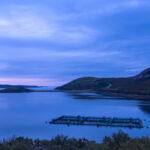When Brazil destroys rainforest protections, Scottish fish farms risk fuelling deforestation with every meal
THE CRYSTAL-CLEAR waters of Loch Fyne couldn’t be much further from the Amazon rainforest, yet Scotland’s prized salmon industry has been undermined by events 6,000 miles away in Brazil where COP30 is about to be held to help save our environment. The collapse of Brazil’s Amazon Soy Moratorium — the world’s most successful forest protection initiative — has exposed an uncomfortable truth the Scottish aquaculture sector has spent decades hiding: every “sustainably farmed” salmon produced in Scotland’s pristine lochs is potentially linked to Amazon destruction.
CADE, the Brazilian equivalent of the UK’s competition authority, announced recently the suspension of the Amazon Soy Moratorium that had been established in 2006 to discourage rainforest clearance for soybean production. Soybean production, which is used largely for poultry, pig and fish feed, takes up an area larger than Germany, and continues to pose a huge deforestation threat to the Amazon rainforest. However, the voluntary Amazon Soy Moratorium prohibited soy purchases from farms which cleared Amazon rainforest after July 2008. Over nearly two decades the moratorium prevented around 18,000 sq/km of Amazon deforestation – an area equivalent in size to Portugal – while allowing Brazilian soy production to expand dramatically on land already cleared. Now that moratorium has been torn up.
This isn’t distant environmental concern Scots can ignore while enjoying a locally-sourced dinner. It’s direct connection between one of Scotland’s few economic Crown Jewels and one of the planet’s most critical ecosystems. The Scottish salmon industry, worth £2 billion annually and employing thousands across the Highlands and Islands, has built its reputation on environmental responsibility and natural production methods. That reputation is now threatened, undermined by an uncomfortable dependency on Brazilian soy.
The Soy destruction fuelling Scottish salmon
At the heart of this environmental catastrophe lies soy production — one of the most environmentally destructive agricultural practices on the planet. Soy delivers mediocre yields which require vast land areas, occupying 125 million hectares (almost 30 per cent of global oil crop area) while supplying just 28 per cent of vegetable oil demand. This inefficiency drives major deforestation, particularly in South America where the Amazon faces increasing strain, releasing greenhouse gases and decimating biodiversity as forests are cleared for soy plantations.
Beyond deforestation, soy production creates a cascade of environmental destruction through water pollution and scarcity from pesticide and fertiliser use, leading to eutrophication which depletes oxygen and kills aquatic life, while soil erosion strips away topsoil essential for carbon storage and plant growth. The industry generates significant greenhouse gas emissions, particularly from soymeal and oil production used for animal feed and biodiesel, while driving biodiversity loss through habitat destruction which devastates wildlife and threatens indigenous communities who depend on these ecosystems.
Soy expansion has had severe social consequences for local communities, causing displacement of people and loss of traditional livelihoods, particularly affecting indigenous peoples while creating exploitative working conditions. The heavy use of pesticides and fertilisers pollutes waterways, harms wildlife, and contributes to antibiotic resistance, while the industry generates massive waste from hulls and chaff which prove difficult to dispose of safely, creating additional environmental contamination.
This is the industrial system powering every “sustainably farmed” Scottish salmon, hidden behind Highland imagery and environmental marketing.
Scottish salmon farmers feed their fish approximately 1.5 million tonnes of imported feed annually, much containing soy protein from Brazil’s expanding agricultural frontier. It takes roughly 1.5 kilograms of feed to produce one kilogram of salmon, meaning Scotland’s annual 200,000 tonnes production requires 300,000 tonnes of feed ingredients. With soy comprising 15-25 per cent of formulations, Scottish farms consume tens of thousands of tonnes of Brazilian soy annually. This is now a weakness that requires attention.
Mowi, the world’s largest salmon producer with extensive Scottish operations, sources feed from major suppliers like BioMar and Skretting. These companies obtain soy protein from global commodity traders including Cargill, Bunge and ADM — companies now freed from moratorium constraints on Amazon sourcing.
Scottish Sea Farms, Cooke Aquaculture Scotland, and other major operators similarly rely on imported soy through complex supply chains ultimately tracing to Brazilian agricultural expansion.
The sustainable Salmon myth
The Scottish salmon industry has built marketing around pristine Highland lochs and traditional methods. While the industry trade body, Aquaculture Scotland, makes grand environmental promises it needs to address feed supply chain impacts. The Scottish Salmon Producers Organisation emphasises welfare standards while remaining quiet about Amazon destruction embedded in every fish meal. Without the shield of the Soy moratorium that issue needs to be addressed.
Scottish salmon carries multiple environmental certifications now proven meaningless in protecting forests. The Aquaculture Stewardship Council (ASC), Global Aquaculture Alliance, and RSPCA Assured schemes all allow Scottish salmon to be marketed as “responsibly farmed” despite potential deforestation links suddenly becoming an issue.
The ASC standard, widely used by Scottish producers, requires feed suppliers to source soy from “responsibly managed” sources but defines this so loosely that deforestation-linked soy can still qualify.
Royal Bank of Scotland and Bank of Scotland provide financing while Scottish pension funds maintain investments in salmon producers, but is their Amazon deforestation due diligence sufficient and transparent?
The Scottish Government has provided substantial subsidies without imposing environmental conditions on feed sourcing. Highlands and Islands Enterprise, Scottish Enterprise promote salmon farming as sustainable while ignoring global environmental impacts.
While the remit of Scottish Environment Protection Agency (SEPA) focuses narrowly on local water quality less understandable is how Marine Scotland’s licensing process excludes global deforestation from assessment criteria.
Likewise, Marks & Spencer, Waitrose, and Edinburgh restaurants rely upon Scottish salmon’s sustainability credentials that conveniently ignore embedded Amazon destruction.
Scottish consumers must confront the fact that premium farmed Scottish salmon in Edinburgh and Glasgow might carry hidden costs measured in Amazon trees and displaced indigenous communities. Having a “Scottish” label becomes meaningless as environmental indicator when production depends fundamentally on Amazonian deforestation-linked feed.
COP26 in Glasgow now seems an age ago. How can Scotland claim environmental leadership while Salmon farming might fuel Amazon deforestation? Without the Soy Moratorium the industry faces a stark choice: implement binding deforestation-free feed sourcing or abandon sustainability marketing claims. Genuine sustainability requires complete supply chain transparency, public disclosure of feed sources, and effective deforestation guarantees.
Until Scottish salmon farming can show genuine supply chain sustainability, consumers will begin to recognise every locally-sourced salmon meal contributes potentially to Amazon destruction. Scotland’s Salmon farmers require to catch up with the developing threat to their environmental reputation they have built for themselves by taking the initiative to enforce their own purchasing moratorium.
Established in 2006, ThinkScotland is not for profit (it makes a loss) and relies on donations to continue publishing our wide range of opinions – you can follow us on X here – like and comment on facebook here and support ThinkScotland by making a donation here.









